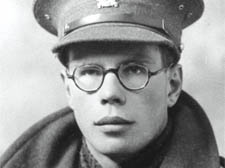|
|
 |
| |
 Lt Hamish Henderson in a sergeant’s great coat in 1942 Lt Hamish Henderson in a sergeant’s great coat in 1942 |
Reflections on the illusions of battle
Alan Brownjohn says Hamish Henderson’s verses from the north African campaign put him in the top rank of Second World War poets
Elegies for the Dead in Cyrenaica. By Hamish Henderson. Polygon £9.99
Hamish Henderson: The making of the Poet, 1919-1953. By Timothy Neat. Polygon £25
HAMISH Henderson is not automatically linked with Alun Lewis, Keith Douglas and Vernon Scannell as among the most notable Second World War poets; but he deserves to be.
The reissue of Henderson’s Elegies for the Dead in Cyrenaica coincides with the publication of the absorbing first volume of a biography by Timothy Neat and is a timely reminder of how vividly this charismatic Scottish poet, songwriter and lifelong socialist captured the atmosphere in which warfare was conducted in the Libyan desert between 1942 and 1944.
The Elegies are also unique in their completely unconventional attitude to the conflict, something developed in profound reflection during the intervals between battles.
There are no hollow heroics here. A captured German officer (held in Cairo where Henderson, Neat tells us, was an interrogator) suggested that the entire campaign was one in which the opposing sides, gaining ground and losing it, yielding up and then recapturing equipment, were in reality allies; the desert was the enemy.
Henderson found the starting point for his Elegies in that observation, and added an extra dimension: the “odd effect of mirage and looking-glass illusion” on exhausted soldiers coping with “deceptive distances and uncertain directions”.
This figures prominently in the Third Elegy, where the enemy is “advancing in familiar vehicles”.
So – “are they mirage – ourselves out of a mirror?” Certainly all are “brothers in death’s proletariat”.
In the Fourth Elegy, he concludes: “We’re uneasy knowing ourselves to be nomads,/ impermanent guests on this bleak moon surface? of dents and ridges, craters and depressions.”
But then the unremitting harshness of the terrain and the horrors of the conflict are always in the foreground: “this landscape of half-wit, stunted ill-will”, “the limitless shabby lion-pelt of the desert”, the “unsearchable moron monotony”.
His Prologue begins with “the dumb-bell guns of violence” and in an Interlude “the barrage” (after “the waiting”) becomes an “exultant hell-harrowing of sound.../ the crashing breakers-hurled rubble of the guns”.
Adrian Mitchell (whose death in December was a sad loss for all who believe poets should denounce war, loudly and clearly) correctly stresses in his introduction to Elegies for the Dead in Cyrenaica the authority Henderson derives from personal experience: “He can write about war because he was there, in the middle of war”.
But the terrain also helped Henderson himself to see that all the combatants were in fact victims, the true crime was war itself and – very importantly – to discern (Mitchell’s words) a “persistence of humanity, even in Hell”.
The severe tone of the Elegies is intermittently lightened by passages of ordinary soldiers’ talk, and in yearning memories of home. There are poignant accounts of German dead in the Seventh Elegy, which is subtitled “Seven Good Germans” but without the patronage in the common use of that phrase.
If you “take a bearing and head for damn-all” you find, in no-man’s land at El Eleba, the graves of seven young German men. They are no different from British dead.
Hamish Henderson also wrote forthright political verse, and bawdy choruses like his “Ballad of King Faruk and Queen Farida”, often sung by soldiers (even today Neat feels he can only dare quote five of its 13 verses).
The Elegies are, of course, more complex, requiring a little close study (and preferably some knowledge of the desert campaigns) before their full impact can be felt.
But readers making the effort to appreciate them will be permanently rewarded, unlikely to forget poems in which, in the end, Henderson decides he “must go on looking for... worlds of whole love, which can slowly gain the power/ to reconcile and heal.” |
| |
|
 |
 |
|
 |
|
 Lt Hamish Henderson in a sergeant’s great coat in 1942
Lt Hamish Henderson in a sergeant’s great coat in 1942
